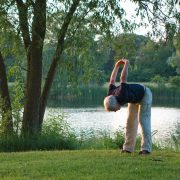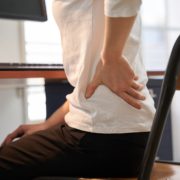Tight hips? Try strengthening instead of stretching.
When you’ve got tight hips, it can interfere with your ability to enjoy walking, running, golfing, and just exercise in general.
Tight hips are not only annoying and achy, but they often contribute to lower back pain as well. But perhaps more frustrating than the tight hips themselves is the fact that no matter how much stretching you do – they never seem to loosen up. Typically when I hear this, it’s a big red flag for me that tight hip muscles aren’t actually your problem.
In other words, just because it feels like you’ve got tight hips – doesn’t mean they actually are tight.
Let me explain.
Your hip muscles can literally be shortened and constricted – in which case – they need lots of stretching. But they can also be “tight” due to weakness or being overworked. When muscles are overtaxed or undertaxed during an activity, they aren’t going to function well and they will find a way to compensate. And this compensation strategy can lead to chronically tight hips over time.
But here’s the thing…
When your hips are tight due to weakness and overcompensation, stretching will not help. Stretching might feel good in the moment, or give you temporary relief, but the tightness in your hips will continue to return until you identify and fix the real underlying problem.
Let’s take your psoas (one of your hip flexors and pelvic stabilizers) as an example to illustrate this concept…
Your psoas is one of your deep hip flexors that also has a connection to your lower back. Although it is capable of flexing (bending) your hip in some capacity – it has more of a stability role. When functioning properly it will assist in exercises like the crunch or sit up, and also work alongside your deep abdominals and glute muscles to help you maintain good upright posture when you’re sitting or standing.
Unfortunately the psoas gets blamed for a lot of things – most notably – tilting your pelvis forward because it’s “tight” and causing lower back pain. The theory is that if you stretch, massage, and “release” your psoas muscle, then you will balance out your pelvis, and your back pain and hip tightness will disappear. But sadly, this is rarely the case. More often than not, your psoas is tight because it’s overworking to compensate for your deep abdominals/core not working properly.
Do your hips ever cramp or feel achy during abdominal work?
Your inclination will be to stretch them but this will simply not work. You have to get your abdominals and deep core to start working properly so that your psoas can actually relax. Once your hip flexors are no longer doing all the work, they won’t feel tight anymore.
This concept of tightness due to overworking and compensation can happen to any muscle in your body. With hips in particular, your psoas along with your piriformis and TFL (tensor fascia latae) are the most common victims. We’ve already spoken about your psoas, but your piriformis and TFL love to compensate for weak gluteal (butt) muscles.
An overworked piriformis leads to difficulty sitting cross-legged and a tight TFL can be painful and lead to IT band problems. You can stretch all you want, but if you don’t address the underlying cause and give these muscles a chance to relax, your hips will constantly feel tight. Plus, stretching in and of itself is a form of load on your muscle. You don’t want to add more load to an already tired and angry muscle.
The moral of this story is that if you’ve got chronically tight hips and stretching all the time isn’t solving your problem, then consider a different approach. Most people don’t consider strengthening an area that feels tight but this could be what you’re missing.
When it comes to hips – the things to look at are your deep abdominals/core and your glutes/butt muscles. Often there’s an underlying weakness in one or more of these areas that you just can’t recognize. Do yourself a favor and talk to an expert who gets this.
Are you local to Portsmouth, NH?
Consider reaching out to one of my specialists by requesting a free discovery visit HERE.
Dr. Carrie Jose, Physical Therapist and Pilates expert, owns CJ Physical Therapy & Pilates in Portsmouth and writes for Seacoast Media Group. To get in touch, email her at [email protected].



